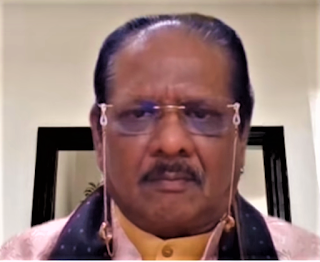Dr. C. S. Pandav: A Champion of Public Health
In this article, we present to you the professional journey of Dr. Chandrakant Sambhaji. Pandav, an eminent medical teacher, nutritionist, epidemiologist, health economist, and community physician from India.
 |
| Dr. C. S. Pandav Image Credit: Rajya Sabha TV |
Who is Dr. C. S. Pandav?
Dr. C. S. Pandav is best known for his contributions to the elimination of iodine deficiency disorders in India. He is an international authority in the prevention and control of iodine deficiency disorders and is famously known as the Iodine Man of India due to his major role in the universal adoption of iodized salt.
While the iodine deficiency disorder control program existed in India since the 1950s, it remained a subnational program restricted to the Himalayan and surrounding regions. Dr. Pandav's work demonstrated that iodine deficiency was a national problem. Thus, it was shown that there was a need for universal salt iodization throughout India.
He is a public health champion and has also immensely contributed to the recent improvements in maternal and child nutrition/health in India through his involvement in the National Nutrition Mission.
Qualifications of Dr. C. S. Pandav
Dr. C. S. Pandav remained attached to highly prestigious academic institutions throughout his career. His medical education journey started with the All India Institute of Medical Sciences from where he did his MBBS and MD in community medicine. He received additional qualifications in nutrition and health economics from the London School of Hygiene & Tropical Medicine and McMaster University, Canada, respectively.
He continued to work at AIIMS, New Delhi, and retired as professor and head of community medicine. He is considered a distinguished and respected public health expert. He has been a former President of the two largest organizations of Indian public health professionals, the Indian Public Health Association, and the Indian Association of Preventive & Social Medicine. He was also a founding member of the International Council for Control of Iodine Deficiency Disorders.
Contributions of Dr. C. S. Pandav
While working at the AIIMS, Dr. Pandav conducted numerous studies on iodine deficiency disorders. These included studies on their epidemiology, modeling, and the economics of their elimination. His findings heavily guided the planners and policy-makers on developing and modifying the strategies of iodine deficiency disorder elimination programs. Moreover, with his expertise, he guided more than 60 developing countries in executing their iodine deficiency control programs. It was due to his efforts and those of like-minded researchers that India introduced a universal salt iodization program in 1986, which was later endorsed by the WHO globally.
After retiring from AIIMS, Dr. Pandav worked with the newly constituted agencies under the National Nutrition Misson (Poshan Abhiyan) and supported the policy-making process for several nutrition-related programs of the Govt. of India.
He has edited several books related to public health and has hundreds of journal articles to his name. For his academic, research, and advisory contributions to the elimination of iodine deficiency disorders in India, he is often credited as being the Iodine Man of India. As a recognition for his contributions to the elimination of iodine deficiency disorders, he was conferred with the prestigious Padma Shri award for his enormous contributions to Indian public health and medicine in 2021.
Legacy of Dr. C. S. Pandav
Young doctors can learn a lot from the legacy of Dr. C. S. Pandav. Apart from solutions to nutritional and public health problems, a common theme in the publications and interviews of Dr. Chandrakan S. Pandav is gratitude to his mentors and gurus for instilling in him the values that contributed to his successes. For example, he often remembers and thanks to his academic and professional mentors, Dr. Vulimiri Ramalingaswamy and Dr. Basil Hetzel, two legendary nutritionists and medical scientists, in his publications and interviews. He even credits his mentors for inspiring him to become a community physician and nutritionist rather than a neurosurgeon, which he originally planned to.
While acknowledging professional mentors is a common trait in most eminent non-clinical doctors, only a few of them acknowledge publically their source of spiritual inspiration. Dr. C. S. Pandav has frequently emphasized the importance of spiritual gurus, such as Swami Vivekananda, Gurunanak Dev Ji, and Guruji in his writings and interviews. In addition, in his writings and interviews, he has also freely appreciated the role of the political executive, prime minister Narendra Modi, in public health programs. In his interviews, he often emphasizes that young doctors must work on the arts of developing professional partnerships and inculcating the art of listening and empathy.
References and Suggested Reading
About the author
Dr. Naval Asija is a licensed MBBS Physician from India. MBBS is the equivalent of the MD degree offered by international medical schools. He is based in Delhi, India, and works as a medical writer, editor, and consultant. He supports medical researchers as an author's editor, medical communication companies involved in medico-marketing activities, and medical technology companies in improving their products. He can be contacted via his LinkedIn Profile: https://www.linkedin.com/in/navalasija/
Disclaimer
By using our website, we imply that you agree to its terms of use and privacy policy. For full details, you can refer to these documents by clicking the links: Privacy Policy and Terms of Use

Comments
Post a Comment
Thank you for your comments. The comments are moderated and hateful content or spam will not be published. The approved comments will go live within a day.